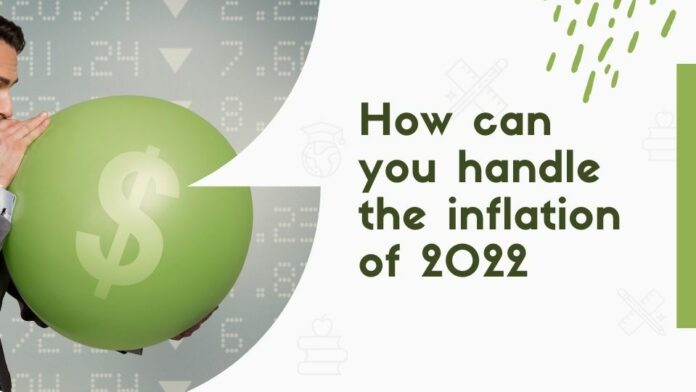Recent international events have led the living expenses to rise at an alarming pace, making inflation a subject of great interest. The rate of inflation has been at its peak. This is a significant issue that makes it very hard for many individuals to keep pace with the increasing prices of essentials.
When inflation rises, individuals generally have lower expendable income on other items. This may lead to decreased consumption, which in turn can result in unemployment and a slowdown in economic development. Inflation may also result in rising interest rates and borrowing expenses, as well as a rise in insurance premiums. In rare instances, inflation may lead to individuals losing their houses or falling into debt.
Yet there is hope! The best way to get through inflation is to be as ready as you can. Keep abreast of economic developments so that you may modify your expenditures properly. You will be better equipped to withstand the consequences of inflation if you take the following actions.
1. Save Money:
Find ways to save money by reviewing your weekly and monthly costs. Monthly subscriptions, such as for streaming video or music, beauty boxes, and gym memberships that you don’t use, may all be dropped to save money.
You might want to do different yard and house cleaning tasks yourself until prices go down. Even the smallest cost reductions may build up to significant potential savings.
Visit https://www.findbestvouchers.com/view/bedtime.co.uk
2. Different methods of grocery shopping.
Changing your grocery shopping habits might have a substantial effect on your bank account. Try purchasing the store brand or generic version of a product if you often buy the name brand. You might save 20 to 25 percent on the same product by taking this action.
Consider buying fruits, vegetables, and meats from the frozen goods section rather than the fresh produce section. They are equally nutritious, endure longer, and are up to 50 percent less expensive.
3. Reduce the energy costs of your house.
The expense of turning the lights on, the water running, and the temperature at a suitable level may mount up quickly. The overall cost of your energy bill might be reduced by approximately 25 percent if you make minor adjustments to your energy use habits.
Some easy things you can do are fix draughty doors and windows, turn the thermostat up a few degrees in the summer and down a few degrees in the winter, replace lighting systems with led light bulbs, buy energy-efficient appliances, take shorter showers, wash clothes in cold water, and fix leaky faucets and ductwork.
4. Do not waste fuel.
Depending on the type of car you drive, a tank of gas could cost you $50 to $100 or more right now. By effectively arranging your travels and tasks, you may extend the duration of each tank.
Instead of traveling to the grocery shop every day, compile a list of the products you can use for the month and make one large trip. If you have many chores to do, plan your travels in the most fuel-efficient manner feasible.
When you’re driving, you might want to slow down by 5 to 10 miles per hour. As a result, your fuel efficiency might increase by up to 14 percent. Also, switch off your automobile when waiting in the school pickup line. A vehicle idling for an hour might use up to a 1/2 gallon of petrol!
5. Eliminate your debt.
If you eliminate your monthly debt commitments from previous expenditures, you will have more money to spend on the items you want now. It is necessary to make at least the minimum payment on your bills each month, but paying extra can help you pay off your debts more quickly. Also, avoid incurring additional debt by paying for items in cash.
6. Earn more money.
Increasing your monthly income is another method for compensating for the growing prices of goods and services. Consider requesting a pay increase from your existing employment. No is the worst possible response. Selling unneeded objects that are accumulating dust in your house is another method for boosting your bank account.
7. Continue saving for retirement.
Even if it has gotten more difficult to spend money on things you need now, it is still vital to put in your future self by saving. Many economic analysts think that you should put away three to six months’ worth of living costs in an emergency reserve account to handle unanticipated emergencies such as job loss, illness, or house maintenance.
If you do not presently have an emergency reserve account, start developing one today. It doesn’t matter if you can only afford to save a modest amount each month; the money you save will build up quickly. Then, be careful to grow your savings as your financial situation allows. Visit https://www.addict2save.com/manomano-discount-code
8. Optimize customer loyalty and incentive programs
Regarding grocery shops, several people enroll in membership schemes provided by their preferred grocery store, such as PC Optimum. Before you start shopping, examine the bargains on your program’s app or website for a brief period of time. Utilize them to generate ideas for your grocery list and gain more points for future purchases.
Keep track of any credit card points or incentives you’ve earned as well. They could be redeemable for cash back, travel discounts, and more. Also, some credit card companies have deals where you can use your points to buy things like merchandise or gift cards, which could be useful and help you save money.
Also, some credit card companies have deals where you can use your points to buy things like merchandise or gift cards, which could be useful and help you save money. Promo and coupon codes are also a very useful way to save money. They can provide you with a handsome discount on your shopping.
Conclusion:
As inflation affects every area of the economy, one of the most effective techniques is to postpone purchases and avoid purchasing non-essentials. This is usually a smart idea if you’re trying to be really thrifty, but it’s especially true if you want to protect yourself against inflationary splinters. Utilize coupons, cash back, reward points, and vouchers to save money in the face of inflation.

